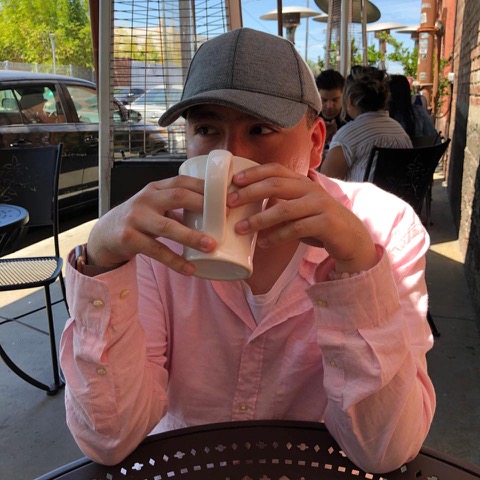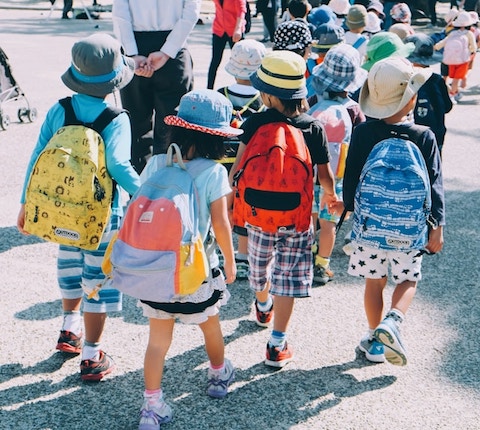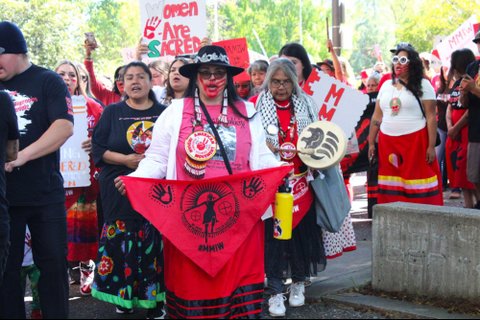
06 Oct Coming Up and Coming Out as a Little Gay Latino in the Bay

“As far as the possibility of being gay, there was no better — no safer — place I could’ve come to that realization to than the Bay Area,” writes the author. (Photo by Monica Mendoza)
Commentary, Joseph De La Cruz
I was 8 years old when I first found out what “gay” was. Correction, it’s the first time I heard the word. I didn’t fully understand the meaning. All I knew was it was something I didn’t want to be. The first time I heard the word “gay” was the way that kids that age always find things out. Or how I thought every kid found things out: being told by a bully.
I was walking the short 10-minute walk from my elementary school in Oakland to my parents’ Mexican American restaurant. It was basically my second home; people in the neighborhood had known me since I was a baby and watched me grow up. It was safe, it was a short distance, and I was responsible. My parents trusted me not to do anything I wasn’t supposed to. (Still, it probably wouldn’t have hurt to have someone around, Mom.)
Kids acted how they always did to me. I was shy. Instead of playing during recess, I sat at the benches with a book in hand. Even though I didn’t know how to read yet, I went off what I saw in the pictures, creating the story in my head. I was always drawn more to the female characters. I was an easy target for other boys.
This bully came up to me with a friend in the short walk to the restaurant. When I looked back on it as a kid, I blamed myself for not walking fast enough. Blaming myself would be a habit that I would start to break once I became older, but as a kid, a quiet kid, that wasn’t going to happen soon.
The kid accosted me, slapped me and pushed me to the ground. But not without calling me “gay.”
When you’re 8 years old, you have no idea what being gay means — unless you’re someone with very progressive parents that talk to you about sexuality at a very young age. In that case, I applaud you. But when you’re the kid of Mexican immigrant parents with a feeling that you might be different from other kids around you, you do everything you can to make sure you’re as normal as can be.
>>>Read: Billions of Dollars Couldn’t Repay My Parents’ Love
Why? Because from a young age, you’ve been told about your parents’ struggles. How they came from this mythical land named Mexico, with its rich culture and history. With the food that your mom cooks you after a long day. The place where your abuela and abuelo are. You can’t see them, but you can talk to them on the phone.
You’ve been told how both of your parents came to the United States, to California, because they wanted something better for their children, for you. For them, you do everything you can to be a normal kid, even though you know deep down, you’re not doing it right.
When you’re a kid, you are taught what is right and what is wrong. When you come from a Mexican family and are raised Catholic, your rights and your wrongs are amplified because there is this figure, God, that is watching you. Pórtate bien, Dios te está viendo. If he is watching, does he know that I feel wrong? Does he know that I don’t always fall asleep when I get sent to bed? Does he know when I don’t let my little brother play with my toys?
Does he know that when I watch “The Little Mermaid” or “Pocahontas,” I want to kiss Prince Eric and John Smith? Can he see that I don’t like getting bullied?
My mom going down to the school to tell my teacher and principal about the bullying solved the issue for the time being. But it didn’t solve the other issue that had developed. Being gay was something I didn’t want to be. It wasn’t until I was getting older, hitting puberty, that the feeling I had of being different was starting to really present itself in my life.
I was having feelings of wanting to be kissed by a boy. Of wanting to find the love that I had seen Disney movies but with a boy. Already I knew this was something that was not going to make my parents’ lives easier.
At 13, I could work a computer and get on Google. My parents could never figure out technology. So I did my research and found out the meaning of the word “gay.” This horrible word that had followed me from my childhood into my teenage years. The trauma of the word alone was enough to make me feel like there was a weight on my chest that no matter how many times I tried to push off, would just not get off of me.
But as far as the possibility of being gay, there was no better — no safer — place I could’ve come to that realization to than the Bay Area.
When I was younger, a part of me wanted to find some excitement — something I think I craved because thinking about how my life could be more exciting was a way to escape the inner conflict that was slowly starting to eat its way inside me. It’s not like I didn’t have parents I knew would love me no matter what; it’s just that the trauma that I had from my third grade bully was the voice that I still heard in the back of my head: You’re gay.
>>>Read: Young Gay Man Had to ‘Get Out of Richmond’ to Find Community
I sought an escape from my hometown, Oakland. Maybe if I was in Los Angeles or Mexico, I could have some excitement in my life. I could escape and become like Miley Cyrus or Selena Gomez and be famous on the Disney Channel. Or maybe I could be like the kids in “Rebelde.” The novela about six teens at an elite boarding school in Mexico City who decided to start a band while dealing with the trials and tribulations of being a teenager is to Mexican teens what “High School Musical” was to my American counterparts. I can’t remember how many times I begged my parents to send me to boarding school. It was in that need to get away that I started to resent the Bay Area.
But the Bay Area had opened its caring, cultured arms to me. I just hadn’t known it. At 16, I had transferred from a public high school to the famous Oakland School for the Arts. At the time, I hadn’t noticed that I was walking alongside a young Zendaya. And at an open mic night, Kehlani would perform Christina Aguilera songs, treating us to her young raw talent before she took on the music world.
In a school of under 500, I was with kids with whom I felt safe. There were kids who were undeniably themselves and had no problem letting others know. “Take me as I am or not at all.”
That was the attitude kids at OSA lived by. And it was something I had to learn myself.
This whole time, I had a voice that had to be heard. While I was still too shy to speak with that voice, it came out in my writing. I would pick up a pen or open a blank Word document on my computer and just write. I would write the stories in my head, take the words that floated around me, and put them in verse form. I would go up at youth poetry slams, bring up the emotion I felt in the moment and just let myself be heard. I would give myself that freedom I needed in those five minutes I was slamming, only to keep that vulnerable part of myself safe when it was over.
BART gave me the keys to the entire Bay Area, taking me to open mic nights in San Francisco. With my close friends, I was getting out of my shell and letting that scared part of me out in some ways every chance I could.
Latin culture is getting there when it comes to being gay. That isn’t to say there isn’t a ways to go because there is. The Latin pop band RBD that came out of “Rebelde” was made up of six members: three guys, three girls. One of my favorites was Christian Chavez. He was just so cool to me because of his hair that was ever changing colors: pink; green; blue; one half orange and the other, yellow.
In March 2007, photos came out of him marrying a man two years before. It was all Univision and Latin entertainment shows were talking about. The photos leaked because he was being blackmailed for money, because being gay was this big crime. Again, the voice from my bully came back to me, You’re gay. The weight came down on me again. People were being interviewed who were disappointed. How could Chavez, a man whom kids and teenagers looked up to, be gay? How could he?
When RBD released a statement expressing their support for Chavez, the weight on my chest got lighter. The Latin world is seemingly starting to be more accepting of queer artists and culture. One of these artists is Bad Bunny, who has described his sexuality as fluid and shown support for the queer community, even dressing in drag for one of his videos. If we have more Latin artists who are open about sexuality, machismo can be left in the past.
My mom was my rock throughout my teenage years. She always, always made sure I knew that no matter what, she would love me. She knew there was something I wanted to say, a mother’s intuition. She didn’t rush me or force it out of me; I think she knew she had to be patient and let me figure it out on my own. For that, I will always thank her.
When I finally came out at 16, it was because I couldn’t hold back anymore. I couldn’t carry the weight on my chest, that feeling that there was something wrong with me. I couldn’t let my bully win.
My mom was the first person I told. She hugged me and held me, while the last chains that tied me down were being broken, the weight on my chest finally dispersing. She asked if I wanted her to help me find a boyfriend. Even now as I write, that still brings a smile to my face and a chuckle.
When I started to let people know, little by little, that I was gay, people ranged from showing me love and to not being shocked. Like I said, OSA was a school of under 500 students. We saw each other more than we did our own families; the friends we made there were an extended family. I never made a big announcement or anything. I wasn’t that type of kid. I just either said it subtly or changed some small detail. I would buy a pink notebook; pink was and still is my favorite color. It seemed like people just knew, and when I would say something, my friends wouldn’t even think twice about it.
For the first time in a long time, I finally felt what 8-year-old me should’ve felt when he was going to school: safe.
As I get older, I look back at how things have been since I came out, especially here in the Bay. I was a sophomore in high school when Prop. 8 was voted in, banning gay marriage around the state. A few short years after that, when I was 21, gay marriage became legal in all 50 states, just in time for me to walk with my school’s gay-straight alliance at the SF Pride parade. I think about how it is easy for me to walk down the street and not worry about getting harassed by someone just because of who I am. Sometimes, just hanging out with friends, going for a drive at Twin Peaks with some food and drinks was enough to make me feel safe.
I think about how the Bay and California seem to be in their own protective bubble. About how hard it is for others in different parts of the world. How hard it has to be for our trans brothers and sister, especially those of color. I think about how good I have it in the Bay Area, and I’m thankful for my home. While I might have wanted something different when I was younger, I realize now the Bay Area was the safest place for me. And that is honestly what makes it home.
This resource is supported in whole or in part by funding provided by the State of California, administered by the California State Library in partnership with the California Department of Social Services and the California Commission on Asian and Pacific Islander American Affairs as part of the Stop the Hate program. To report a hate incident or hate crime and get support, go to CA vs Hate.






damana game
Posted at 04:37h, 02 JulyThis post beautifully captures the essence of identity and community! I love how the author shares personal experiences while navigating life in the Bay. It’s inspiring to see representation and storytelling that resonates so deeply. Thank you for shedding light on such important topics!
Dg Club Game
Posted at 14:09h, 10 JulyWhat a heartfelt and beautifully written post! It’s so refreshing to see stories that capture the vibrant essence of the LGBTQ+ community in the Bay Area. Your experiences and perspectives truly resonate and highlight the importance of representation. Thank you for sharing your journey!
99 Club Login
Posted at 18:56h, 18 JulyLoved reading this post! It’s so important to see diverse voices and experiences represented in the LGBTQ+ community. The journey of navigating identity and culture in the Bay Area is beautifully captured here. Keep up the great work!
dm Game Login
Posted at 16:31h, 28 AugustWhat a heartfelt and powerful piece! It’s inspiring to see stories like this that celebrate identity and community. Thank you for sharing your experience!